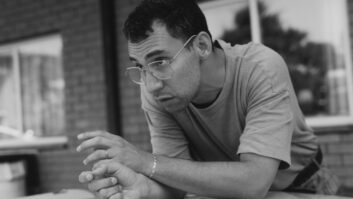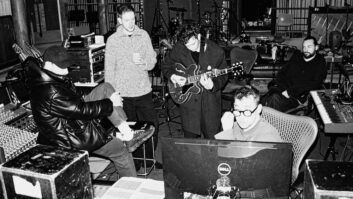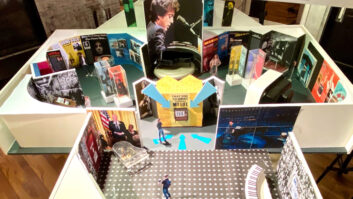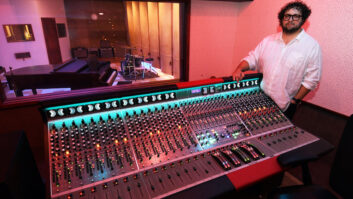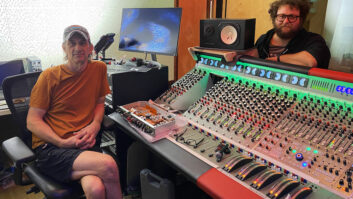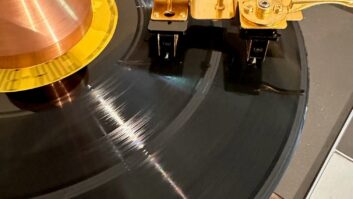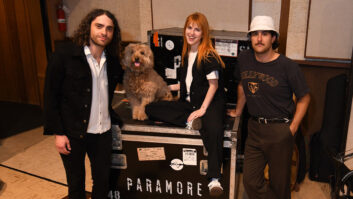
Music, Etc. has always been a popular column in Pro Sound News and here on prosoundnetwork.com. The monthly Q&A with artists, exploring the recording process behind their latest album, is always revealing, whether it delves into their approach to songwriting, creative mindset or something else. Ten years ago this month, Music Etc. featured an emerging Nashville star by the name of Taylor Swift, speaking about Fearless, which was only her second album. She sounded like a longtime pro—and at the age of 18, she already was.
Music, Etc.—Swift Rise to Stardom
Taylor Swift created something of a sensation on the Nashville scene when she released her first single, “Tim McGraw,” at the age of 16, just two years ago. Her sophomore album, Fearless, which she co-produced with longtime collaborator, Nathan Chapman, sees her sharpening her writing skills even further and becoming increasingly confident in the studio.
If downloads of the advance single, “Fearless,” are any indication, Swift is about to enjoy yet another wave of even bigger success: Last month, the song was the number-one track on iTunes across all genres. Pro Sound News spoke to Swift about how she changed things up this time around—both in the studio and as a writer.
On Recording at Starstruck Studios:
We recorded this album primarily at Starstruck, which has an incredible feel to it—it makes you feel comfortable. When I’m comfortable, I give better direction to the band, and I certainly found that comfort level on this record. The vocal booth was on this balcony where you can see everything. Having Nick Buda (drummer) right below me where I could see what he was playing was great. Also, being able to look at the engineer and see him while he is talking is very important to me.
On Capturing Vocal Performances:
I trust my co-producer, Nathan Chapman, with all the equipment choices. He’s worked with me since I was 14 and has such a good ear for what sounds good with my voice when it comes to microphones. We switch up the vocal mics from time to time, and it’s always different; we don’t have any preconceived formula. During some of the early tracking sessions, I would sing live vocals and we would often end up using those instead of having to go back and re-cut vocals.
On Working Out Instrumentation:
I haven’t played much guitar on this record, because for me, it’s about the direction of what I want the other musicians to be doing—I really leave the guitar playing up to Nathan. I’ll typically play everyone a song that I wrote, and we start out with three musicians: Tim Marks on bass, Nathan on guitar, Nick Buda on drums and myself on vocals. We then track it in “garage band” style.
On Co-Producing with Nathan Chapman:
It’s really cool to be recognized as a co-producer on the album. When I write a song, I hear it completely produced in my head. I hear exactly what is going on in the track: the intro and the musical hook. For me, it’s all a matter of getting into the studio and accurately representing what’s in my head to the band, and working with Nathan to make sure it comes out exactly this way in the studio. Sometimes, I will hear a guitar solo and then sing it to the band. Or I will hear a bass line or even strings and sing it to them. I never learned how to read music—it felt like math to me. Music has always been much more feeling-based; I write music because that’s how I deal with my emotions.
On Keeping the Magic in a Vocal Track:
I’ve worked with producers that have just drilled me into the ground until everything was just perfect—until they had 18 takes of each word. Nathan isn’t like that and lets the song unfold naturally. He believes in capturing the magic in a song and doesn’t make me sing any more than about three times. The majority of them are one-take songs—for example, my first single, “Tim McGraw,” was a one-take. Vocal fatigue never happens when I am tracking with Nathan.
On Evolving As a Writer:
When I was writing the first record, I was a staff songwriter at a music publishing company. My job was to co-write—it’s what I was there to do, and I was supposed to write with as many people as possible. So the majority of my first album was co-written, and then there were three songs I wrote by myself. On my new album, I wrote eight songs by myself when I was on the road. I used to depend on a co-writer to edit the nuances and intricacies of a song, but once I went on the road and started touring, [I began to] have the arguments with myself and become my own editor. Something I’m really proud of is seeing my name as the writer down in the corner of the screen at the end of a video.
On Adding Last-Minute Songs:
The recording process on this album was spread out over the last year. We started recording last winter, and we did about three songs. About a month later, we did three more. Two weeks before the album had to be turned in and mastered, after all the other songs were finished, I wrote a new song and also decided that I wanted to put another song that we already recorded onto the album, making 13 tracks instead of 11. I went to the label and said, “Is there any way we could get an emergency recording session? I need to record this new song.” And [laughs] my record label president took a deep breath and said, “Yes, I guess you can do that.”
I’ve always seemed to challenge myself really late in the game in the studio. On the last record, I did the same thing with a song called, “Should’ve Said No,” which I hadn’t even finished yet. But I had a gut feeling about the song, so at the end of a recording session, I asked Nathan if I could get the band to track it once, thinking I would write the rest later. That actually ended up being my second number-one song. On this album, I did “Forever and Always” and turned it into the mixer, who turned it into the mastering guy just hours before the entire project was due.
On Building Success a Step At a Time:
I feel like the second album was a lot easier. Nathan and I never, ever want to slack off and say, “We’ve had success; this is going to be easy.” But knowing that we did have success with the first album gave us confidence that what we were doing was good. You always want to keep that quiet confidence without ever letting it go to your head, without feeling cocky and thinking that everything you touch is going to go platinum.
